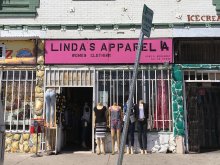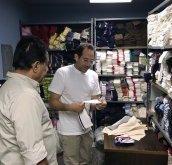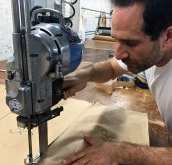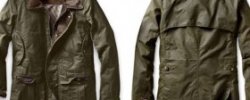 Dov Charney, the president of American Apparel who was simply required from the business in a 2014 boardroom coup, has actually a brand new gig: He has started a T-shirt business with some of his old peers from American Apparel and it is currently shipping product. Charney thinks he is able to hit revenue of $30 million with annually, he told company Insider.
Dov Charney, the president of American Apparel who was simply required from the business in a 2014 boardroom coup, has actually a brand new gig: He has started a T-shirt business with some of his old peers from American Apparel and it is currently shipping product. Charney thinks he is able to hit revenue of $30 million with annually, he told company Insider.
Charney declined to state the name of his brand new brand, though he has got started publishing photos on a site titled "that is Los Angeles." His brand name will likely to be motivated by the little, independent, immigrant, and working-class retail stores associated with the less glamorous side of Los Angeles typified by these pictures:"i've a secret factory, I do not subcontract, " he says. "I have about 40 employees."Right presently there is no web page no consumer retail region of the business. He could be just shipping wholesale sales to clients which understand him physically.Initially, Charney is concentrating on T-shirts — this product he launched American Apparel within the 1980s. "we have developed newer and more effective forms and new figures, " he said. "T-shirts have become particular. Two T-shirts look the same from afar, but close up it is two different films. There is something various about them even if they are the same brand, same size, exact same color."American Apparel tees became popular because Charney pioneered a good, fitted top in a time (the 1990s and early 2000s) whenever many T-shirts were baggy. He additionally offered males's variations longer torsos for a far more flattering appearance. Now, Charney told us, he could be looking for a new T-shirt fit "for the next decade."Charney is keeping the "made in la" ethos which he championed with United states Apparel by declining to employ offshore apparel employees although doing this would cost a lower amount. He believes owning a factory in america with precisely paid staff members lets him turn around sales quicker, plus in smaller customized batches, than if he'd to purchase them from Vietnam.The business will likely be built around "rapid reaction" and "dynamic supply" — a market in which a vertical garment producer in l . a . can certainly still beat a cheaper, bigger one in Asia.he's got a tiny bit of trader financing. Several of their financing has come from his own workers, with made that loan towards the organization. Charney claims he promises to fundamentally offer those workers equity inside business. He declined to show specific numbers.Charney will additionally be looking for investors from principal Street, perhaps via crowdsourcing, because institutional investors are way too afraid becoming involved in him any longer. (Charney's advertising and marketing at American Apparel ended up being hypersexual, in which he ended up being sued repeatedly by workers which alleged harassment, though all those suits were satisfied or thrown out.)"select institutional investors are frightened according to — I'm not many institutional option, you-know-what i am talking about?" he said. "The unpredictable nature of my company plus the way we execute my affairs and my entire contrarian sight it is not favorable towards institutional model ... they are interested in predictability, and my whole company flourishes on unpredictability."We asked Charney whether he previously also changed their personal behavior. At American Apparel he frequently dated the models which appeared in their campaigns, a habit that lured bad publicity. Charney believed that their individual life was no one else's company.
There is something various about them even if they are the same brand, same size, exact same color."American Apparel tees became popular because Charney pioneered a good, fitted top in a time (the 1990s and early 2000s) whenever many T-shirts were baggy. He additionally offered males's variations longer torsos for a far more flattering appearance. Now, Charney told us, he could be looking for a new T-shirt fit "for the next decade."Charney is keeping the "made in la" ethos which he championed with United states Apparel by declining to employ offshore apparel employees although doing this would cost a lower amount. He believes owning a factory in america with precisely paid staff members lets him turn around sales quicker, plus in smaller customized batches, than if he'd to purchase them from Vietnam.The business will likely be built around "rapid reaction" and "dynamic supply" — a market in which a vertical garment producer in l . a . can certainly still beat a cheaper, bigger one in Asia.he's got a tiny bit of trader financing. Several of their financing has come from his own workers, with made that loan towards the organization. Charney claims he promises to fundamentally offer those workers equity inside business. He declined to show specific numbers.Charney will additionally be looking for investors from principal Street, perhaps via crowdsourcing, because institutional investors are way too afraid becoming involved in him any longer. (Charney's advertising and marketing at American Apparel ended up being hypersexual, in which he ended up being sued repeatedly by workers which alleged harassment, though all those suits were satisfied or thrown out.)"select institutional investors are frightened according to — I'm not many institutional option, you-know-what i am talking about?" he said. "The unpredictable nature of my company plus the way we execute my affairs and my entire contrarian sight it is not favorable towards institutional model ... they are interested in predictability, and my whole company flourishes on unpredictability."We asked Charney whether he previously also changed their personal behavior. At American Apparel he frequently dated the models which appeared in their campaigns, a habit that lured bad publicity. Charney believed that their individual life was no one else's company.
"i am adhering to my first principles, " he said. "I do not think my behavior had been bad. I don't think I was a bad person. I am passionate. I'll inform you how I roll — it is most work. There is very little time for play. It is a seven-day, 365 energy. There is a myth and there is a real possibility. There's also the truth of a guy's age, you realize? I Am 47. I don't think i really could keep up with the myth even if desired to."













